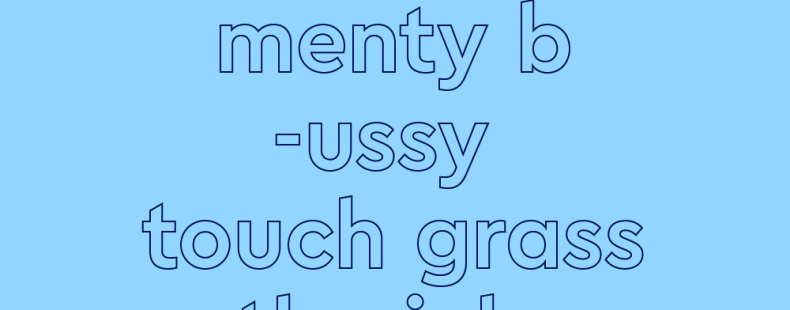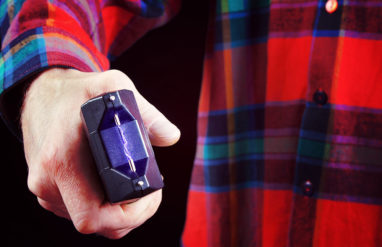Now more than ever, there’s a firehose of slang terms flowing from TikTok vids, Twitch streams, Twitter memes, and the other outlets of the extremely online.
What’s a menty b? Why are TikTokers adding -ussy to everything? What does it mean to be told to touch grass? You might be sorry you asked, but we’re going to explain it all.
We’ll also provide insights into what these trends mean for the evolution of language, from the perspective of professional language observers like linguists and lexicographers. Stick around until the end for our prediction about how long these words will stay in use.
Online slang as a window into communities and cultures
“The internet exposes people to slang and other dialects or words that are sometimes specific to a different group of people and their experiences. It’s a glimpse into a different view of the world when we learn other groups’ slang or technical terms.”
—Dictionary.com lexicographer Heather Bonikowski
rizz
What it means: Rizz is a slang term for skill in charming or seducing a potential romantic partner. It is most commonly applied in the context of men pursuing women, but not always. It’s typically used in the exact same way as the older slang term game.
Where it comes from: Rizz was popularized by social media personality Kai Cenat, who has used the term since at least 2021 in his dating videos and Twitch streams.
Why linguists are interested: Rizz is thought to be a shortening of charisma, which is notable because, unlike the vast majority of slang terms that are formed by shortening an existing word, it comes from the sound in the middle of the word, not the beginning or the end.
-ussy
What it means: Yes, it’s what you think it is: an ending extracted from the word pussy that gets added to other words like robussy (meaning “robot pussy”) or dragussy (“dragon pussy”). On social media, -ussy is also used more generally (and nonsexually) to refer to objects with holes in them (calling a calzone a pizzussy, for example) or to any object or person.
Where it comes from: Popular since at least the early 2000s and within the LGBTQ+ community, -ussy was originally used in terms like bussy (“boy pussy”) and mussy (“man pussy”). It’s very much an online thing.
Why linguists are interested: The so-called -ussification of every imaginable word on social media represents an interesting trend in slang formation. To get technical, -ussy is what’s called a combining form, which means it only gets used in combination with other word parts to form new terms. Linguists keep a close eye on trends like this. In fact, the recent convention of the American Dialect Society (ADS)—whose members include both professionals and amateurs “dedicated to the study of the English language in North America”—culminated with -ussy winning out as the society’s pick for its 2022 word of the year.
quiet quitting
What it means: Quiet quitting doesn’t refer to literally quitting your job but instead to the practice of reducing the amount of effort you devote to your job, such as by avoiding any tasks not explicitly stated in the job description.
Why linguists are interested: At that same recent ADS meeting, members voted quiet quitting as the slang term “most likely to succeed.” That’s a reflection of how strongly the term seems to resonate with people and how quickly it was established as essential vocabulary in the discussion of worker discontent. Related terms that you’ve probably also started encountering are quiet hiring and quiet firing.
-verse
What it means: Extracted from the word universe, -verse is combined with other terms as a name for a particular realm or environment.
Why linguists are interested: The popularity of -verse is apparent in constructions like Twitterverse and Potterverse (the fictional world of the Harry Potter stories). The word metaverse was coined by US author Neal Stephenson in his 1992 cyberpunk novel Snow Crash, about 30 years before Facebook parent company Meta adopted it as the name of its VR platform.
menty b
What it means: Menty b is not a new hip-hop artist (that we know of), but rather a cutesy shortening of the much more serious phrase mental breakdown.
Where it comes from: The term menty b is popular on TikTok, where it is commonly used to refer to stressful situations or moments in which TikTokers are feeling overwhelmed by life. The term is particularly popular in Australia.
Why linguists are interested: Menty b is perhaps the most prominent current example of a slang trend that involves shortening a multi-word phrase by clipping its different parts separately. A similarly formed term is cozzie livs, slang for “cost of living.”
touch grass
What it means: The phrase touch grass means “go outside.” It’s usually used in an insulting way to imply that someone spends too much time online, perhaps posting on social media or losing at video games, and that they should go outside for once—or at least away from other people!
Unfortunate note: There is a strong correlation between knowing what this term means and it applying to you.
the ick
What it means: In dating culture and on TikTok, the ick refers to a sudden feeling of disgust or revulsion toward a person, usually one’s date. Almost anything can cause someone to feel the ick, such as the way a person dresses, the way they smell, or the way they treat a server. But once you catch the ick, you’re basically done with the other person.
Where it comes from: The term the ick is thought to have been originally coined for the late 1990s TV show Ally McBeal.
Unfortunate note: If you remember Ally McBeal, the internet thinks you are old.
nepo baby
What it means: The term nepo baby refers to a famous person who has at least one parent who is also famous. It’s often used as a negative term to suggest that a celebrity didn’t actually earn success and only gets opportunities because of their family connections.
Where it comes from: The word nepo comes from nepotism. The term gained widespread use and attention in late 2022 when New York magazine used the term in a cover story that profiled the famous children of Hollywood celebrities.
Learn to speak the language of contemporary dating by reviewing some top terms making the rounds.
How long will these slang terms last?
“I have huge doubts about the longevity of most of these words,” says Bonikowski.
Why? Because many popular slang terms burn brightly but flame out after getting mentioned in media reports and explainers (like the one you’re reading right now 😬) and then entering the mainstream, when people’s parents start using them.
“Nothing is a sharper nail in the coffin for slang,” Bonikowski says. Case in point: “Yeet was on the upswing—and then wasn’t.”
Take the quiz
You’ve seen these definitions—can you pass the quiz? Don’t get the ick on us now! Here’s your quiz: The Rizzussyverse: How Many Of These Slang Trends Do You Know?














